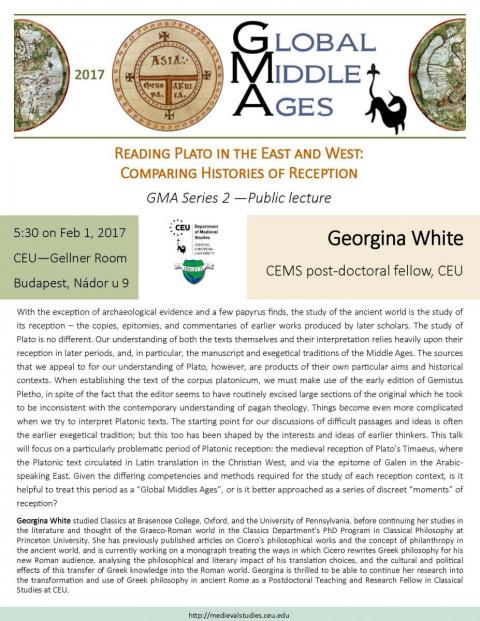A Public Lecture by Georgina White (CEMS Post-doctoral Fellow) on "Reading Plato in the East and West: Comparing Histories of Reception," January 1, 5.30pm, Gellner Room, CEU

With the exception of archaeological evidence and a few papyrus finds, the study of the ancient world is the study of its reception – the copies, epitomies, and commentaries of earlier works produced by later scholars. The study of Plato is no different. Our understanding of both the texts themselves and their interpretation relies heavily upon their reception in later periods, and, in particular, the manuscript and exegetical traditions of the Middle Ages. The sources that we appeal to for our understanding of Plato, however, are products of their own particular aims and historical contexts. When establishing the text of the corpus platonicum, we must make use of the early edition of Gemistus Pletho, in spite of the fact that the editor seems to have routinely excised large sections of the original which he took to be inconsistent with the contemporary understanding of pagan theology. Things become even more complicated when we try to interpret Platonic texts. The starting point for our discussions of difficult passages and ideas is often the earlier exegetical tradition; but this too has been shaped by the interests and ideas of earlier thinkers. This talk will focus on a particularly problematic period of Platonic reception: the medieval reception of Plato’s Timaeus, where the Platonic text circulated in Latin translation in the Christian West, and via the epitome of Galen in the Arabic-speaking East. Given the differing competencies and methods required for the study of each reception context, is it helpful to treat this period as a “Global Middles Ages”, or is it better approached as a series of discreet “moments” of reception?
Georgina White studied Classics at Brasenose College, Oxford, and the University of Pennsylvania, before continuing her studies in the literature and thought of the Graeco-Roman world in the Classics Department's PhD Program in Classical Philosophy at Princeton University. She has previously published articles on Cicero’s philosophical works and the concept of philanthropy in the ancient world, and is currently working on a monograph treating the ways in which Cicero rewrites Greek philosophy for his new Roman audience, analysing the philosophical and literary impact of his translation choices, and the cultural and political effects of this transfer of Greek knowledge into the Roman world. Georgina is thrilled to be able to continue her research into the transformation and use of Greek philosophy in ancient Rome as a Postdoctoral Teaching and Research Fellow in Classical Studies at CEU.